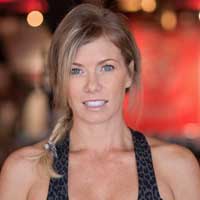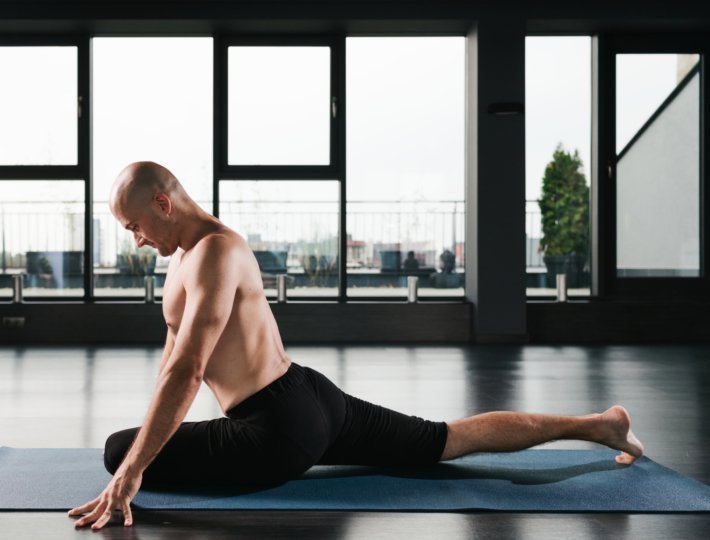As a certified fitness trainer for more than 20 years and the co-owner of Drenched Fitness in Westlake, California, I’m very familiar with New Year’s resolutions. But I’m even more familiar with broken New Year’s resolutions. (Of the 45% of Americans who make resolutions, a mere 8% are successful in keeping them, according to a 2014 study by the University of Scranton published in the Journal of Clinical Psychology.) So, in an attempt to help myself and others achieve our wellness goals—whether it’s to lose the holiday pounds, step up our fitness game, or commence a meditation practice—I consulted a few trusted colleagues who are life coaches and psychotherapists.
The number-one question on my list: What is it that prevents so many of us from becoming the healthiest and best all-around person we can be? Both experts had the same answer: fear. To be more specific, fear of failure (“Even if I go to the gym a few times, I won’t stick with it”); fear of success (“What if I end up loving those bi-weekly workouts? It’ll take time away from the kids”); fear of being judged (“I’m so out of shape—people will make fun of me if I go to yoga looking like this”); fear of not being perfect (“I’ll never be able to sit still and meditate for 20 minutes—why should I even try?”); and this biggie: fear of change.
“Even if we want to change and the way we are changing is good, it’s still unfamiliar and scary,” explains Susan C. Vaughan, M.D., a leading New York City-based psychiatrist and the author of Half Empty, Half Full: Understanding the Psychological Roots of Optimism. “Luckily, change usually doesn’t happen in large dramatic moments but through the slow accretion of small changes. For instance, we aren’t suddenly 25 pounds lighter and a marathon runner—we have time to adapt to each new weight and each milestone as a runner.”
Of course, part of the problem is that we’d like to be able to snap our fingers and instantly be a master meditator or the proud owner of a six-pack stomach. I once had client who came to me wanting to get back in shape after taking some time off from working out following the birth of her kids. But when she arrived on day one, she was unrealistic about her starting point—what she was currently capable of, strength- and stamina-wise. She kept recalling how much fitter she used to be, quickly became frustrated, and lost exercise motivation. She never made it to day two.
I tried to explain to the client that she would eventually get back to her former, fitter self if she took baby steps, but the thought of the journey ahead probably overwhelmed her. “Fear can prevent us from making even small changes,” says Vaughan. But she added that we shouldn’t let that stop us trying: “It’s important to realize that we can recognize that we are fearful and do whatever it is we need to do anyway. Feelings are not facts, and no one ever died of being afraid and pushing oneself anyway. At some level we need to not take our fears too seriously.”
I often find myself telling my clients (and myself!) that we shouldn’t give fear more thought than it deserves. After all, our fear isn’t special—we all have fear. Not only that, but “it’s the most boring thing about you,” says the Eat Pray Love author Elizabeth Gilbert. She put fear in its place while on the road addressing audiences as part of Oprah Winfrey’s The Life You Want Tour:
Fear is boring, because fear only ever has one thing to say to us, and that thing is: “STOP!”… Fear never has a more interesting insight to offer. Never. Just that one word, repeated and repeated with increasing hysteria: “STOP STOP STOP STOP STOP!” My fear wants me to stop, because my fear wants me to be safe, and my fear perceives all motion, all inspiration, all work, all activity, all passion whatsoever as potentially life-threatening. My fear wants me to live a smaller life. The smallest imaginable life, ideally. My fear would prefer that I never got out of bed.
So how can we begin to conquer our fear and get on with the business of being the best we can be in 2015? First, we need to decide to put the past in the rearview mirror. “It’s just not the end of the world if you overate or slept in every day over the holidays and didn’t go to the gym, nor is being 10 or 20 pounds overweight,” says Carol Look, intuitive energy healer and author of Stop Feeling Lazy: How to Break the Procrastination Cycle Once and For All and Excel. “It’s important to say, ‘I’m turning over a new page. I’m now feeling grateful for my life and my body, and I’m feeling inspired. I’m starting new habits.’”
Next, get going already! “Fear lessens in the face of action,” says Vaughan. “Sometimes fears become bigger and bigger in our heads the more we procrastinate, so just doing some little something and breaking the task into little goals—‘I will start to drink the right amount of water,’ or ‘I will cut out that morning muffin’)—cuts the fear down to size.”
Take out the calendar and start penciling in those meditation sessions or group fitness classes. “If it’s not on your list of things to do, it’s going to fall off,” Look says. “You have to build it in because it’s not a habit yet.”
Look also suggests giving yourself credit for small victories with a new kind of gratitude list. “I like another version of it: 10 Things I’m Happy About or What I Love About My Life. Those things can be as simple as ‘I got my laundry done yesterday’ or ‘I made it to the gym.’ Focus on positive things rather than what’s wrong or something you can criticize about yourself. It completely changes your frame of mind; it changes the neurons in your brain.”
But what if you end up falling off the wagon? Look says “finding your why” should inspire you to climb back on. “Ask yourself, ‘Why was I doing this?’ Not just ‘because I want to lose 10 pounds and look better in a pair of jeans.’ Look at the big picture. ‘I want to be good to myself, I want to respect my body, and I want to feel strong and energetic for my kids.’ That will get you back [on track] the next day.”
And remember to always be gentle with yourself. Your body is not like a car—you can’t expect it to go 60 miles an hour every time you step on the gas. It will feel and perform differently depending on your mood, your stress level, how much sleep you’ve had, and where you are in your menstrual cycle.
Finally, don’t get so hung up on the whole “new year, new you” thing. As Vaughan reminds us, “We can always start over in each and every moment. It needn’t be January 1 or Monday or any other time to push the reset button and get down to work. No one moment is more magical than any other in which to change.”
This article is a contribution from Julie Kennington, as told to Lori Majewski.












Comments (0)